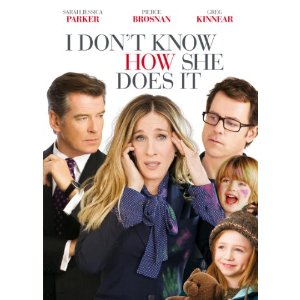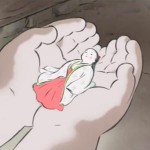The story of a workaholic who suffers a crisis at home only to realize the value of family is a staple in Hollywood, best seen in examples like the underrated 2000 “The Family Man.” Sarah Jessica Parker attempts to update this story by telling it from the mother’s perspective in “I Don’t Know How She Does It,” but the movie dishes up tired humor and little insight with a subject that, in better hands, would hit home for most women.
Parker is Kate Reddy, an investment banker with small children at home, the protagonist of the novel by Allison Pearson on which the movie is based. When her architect husband (Greg Kinnear) lands his own dream job at the same time that Kate spearheads a huge investment deal, the demands of her job stretch the family to the breaking point. With the help of a long-suffering nanny, Kate keeps her head above water at work, but loses the faith of her children.
Kate’s biggest problem is the demands she puts on herself, but she repeatedly blames the system for placing expectations upon her. Birthday parties must be large affairs complete with clouds of balloons, politically correct snacks, culturally appropriate piñatas, and hordes of shrieking children. When she is asked to contribute to the school bake sale, she needs her daughter and, more importantly, her daughter’s classmates’ mothers, to think she has baked a pie herself.
In other words, Kate just can’t say no.
Although she blames societal expectations, the person to whom she can’t say no is herself.
For much of the film, it’s not a question of simply spending time with her children, reading, playing, or drawing. In fact, the one time she’s home after a trip, she sits them in front of cartoons when presumably they are just aching for a game of Chutes and Ladders with mom.
It may seem like a small issue, and certainly is exaggerated in the film by Hollywood sparkle, but the point isn’t minor. Let’s be honest. An intelligent and driven woman like Kate will often find small children boring. After all, even My Little Pony loses its charm in the seven hundredth hour. At least planning a blow-out party uses her type-A organizational skills. The real-life choice isn’t between the excitement of the office and competing with other moms through bake sales or parties. Both are adult-world issues and completely irrelevant to children. The choice is between the office and getting on the carpet for an hour of vroom-vroom noises with matchbox cars.
This basic misunderstanding of motherhood isn’t the only weakness in the movie. Most of the surrounding characters come off as dull as a sleeping two year old. The best friend (Christina Hendricks) is an outrageous beauty, Kate’s husband a long-suffering metrosexual, and the new boss (Pierce Brosnan) a sensitive charmer. Extra venom is reserved for a stay at home mom, whose vapid judgments are pronounced from an elliptical machine as she whiles away the school day with her personal trainer. Only Olivia Munn as Kate’s prickly assistant packs any spark into her character. The spark snuffs out, however, when she becomes pregnant part way through the film and turns into a nauseous klutz instead of the razor-sharp wit she had been.
 The film uses gags that should be funny, but mostly aren’t. Watch Kate suck pancake batter off her suit collar. Watch her battle lice while trying to land a deal. She is forever pulling toys out of her purse, forgetting things, and banging her multiple bags as she claws her way into taxis.
The film uses gags that should be funny, but mostly aren’t. Watch Kate suck pancake batter off her suit collar. Watch her battle lice while trying to land a deal. She is forever pulling toys out of her purse, forgetting things, and banging her multiple bags as she claws her way into taxis.
Like the book, the film spends a lot of time comparing the world of working men to working women, as if male investment bankers never had to choose between a meeting and their kid’s soccer game. Women are judged differently and unfairly, it whines. This may be true, but most women in the work world have learned to deal with it. The film feels about fifteen years old. Tina Fey and Amy Poehler have traveled this ground with much more insight and humor than this movie.
I speak with some experience on maternal chaos. In my kids’ diapers and bottles days, I gussied up to visit my husband at the office (in the US Congress, no less!), only to have it dawn on me with dark horror as I walked in the door that may tasteful and recently-purchased blouse was on inside out.
Not just once. Two separate times.
With seams showing and tags waving in the wind like little flags celebrating my utter inability to operate in the adult world.
Children do, indeed, upend one’s life and make it a never-ending merry-go-round of joy, frustration, food stains, and magical moments. Sadly, this movie focuses Kate on her adult concerns and misses the magic of the merry-go-round.
















